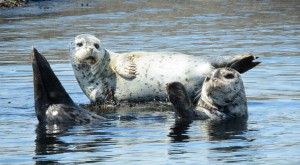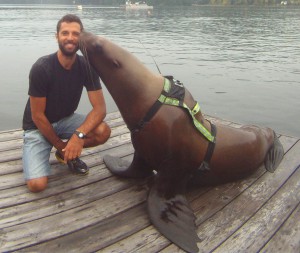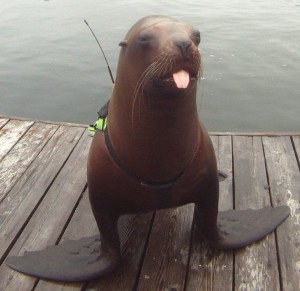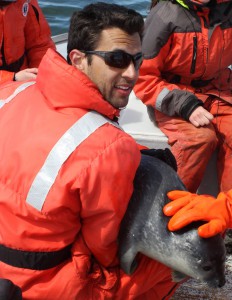Tel: 604.822.8181
Fax: 604.822.8180
E-mail: h.allegue@oceans.ubc.ca
Supervisor: Dr. Andrew Trites
Education:
- BSc. Biology, Université du Québec à Montréal (UQAM), Canada.
- Software Engineering, École Polytechnique de Montréal, Canada.
Research Interests:
- Population and community ecology.
- Variation in animal behavior.
- Animal telemetry.
Research Area: Strait of Georgia (British Columbia, Canada)
Habitat use and foraging behavior of harbor seals (Phoca vitulina) in the Strait of Georgia
 Problematic:
Problematic:
Since the 1970’s, the Strait of Georgia has faced a significant decrease in both Chinook and Coho salmon populations. Today, these declines highly concern commercial and recreational fishing industry. Multiple factors have been investigated to justify the salmon populations situation like over-fishing, climate changes and anthropogenic perturbations. However, many have speculated that harbor seals predation represents one of the principal reason interfering with the salmon populations recovery. Indeed, since their protection in the early 1970’s, harbor seals populations have grown exponentially during the same period that salmon populations experimented a steep decline.
Research direction:
My work is focused to quantify the intensity of harbor seals predation on Chinook and Coho salmon populations. In this case, foraging behavior of harbor seals will be investigated by considering their habitat use, spatial and temporal distribution, dive type and diet composition. The ultimate goal of this project is to provide the maximum information on the predator-prey relationship existing between seals and salmons in order to realize more efficient and sustainable management decisions.
Ongoing projects
Validation of new method to estimate the energy expenditure of Steller sea lions (Eumetopias jubatus)
 One of the most important parameters used in ecology to investigate animals foraging behavior is the energy expenditure, which is directly related to their growth and reproductive success (fitness). In the majority of the vertebrates, locomotion is the major cost contributing to energy expenditure during the foraging period which could be estimated by the body acceleration. Today, through to technology advancement, acceleration is easily measured using miniature data logging tags attached to animals that incorporate three-axis accelerometers and magnetometers. Basically, the accelerometer measure the animal raw acceleration composed by the static acceleration (gravity: low frequency) and the dynamic acceleration (animal movement: high frequency). The main difficulty here is to separate correctly the static and the dynamic acceleration from the raw acceleration.
One of the most important parameters used in ecology to investigate animals foraging behavior is the energy expenditure, which is directly related to their growth and reproductive success (fitness). In the majority of the vertebrates, locomotion is the major cost contributing to energy expenditure during the foraging period which could be estimated by the body acceleration. Today, through to technology advancement, acceleration is easily measured using miniature data logging tags attached to animals that incorporate three-axis accelerometers and magnetometers. Basically, the accelerometer measure the animal raw acceleration composed by the static acceleration (gravity: low frequency) and the dynamic acceleration (animal movement: high frequency). The main difficulty here is to separate correctly the static and the dynamic acceleration from the raw acceleration.
A new method called ELBA (Estimated linear body acceleration) that uses a gyroscope in addition to the accelerometer has been developed to avoid extra acceleration signals due to the animal rotations. Effectively, Ware et al. (in review) showed that ELBA estimates more accurately the animal speed than other methods using only accelerometer measurements.
 As a logical continuation of that project, my work consists in finding the relationship between the animal energy expenditure and ELBA. To achieve this objective, we attached an OpenTag Loggerhead Instruments incorporating an accelerometer, a magnetometer and a gyroscope on 4 trained female Steller sea lions (Eumetopias jubatus) housed at the UBC Open Water Research Station (Port Moody, British Columbia, Canada). Furthermore, a respirometry dome is used to measure the animal oxygen consumption after each dive which provides us accurate energy expenditure estimations.
As a logical continuation of that project, my work consists in finding the relationship between the animal energy expenditure and ELBA. To achieve this objective, we attached an OpenTag Loggerhead Instruments incorporating an accelerometer, a magnetometer and a gyroscope on 4 trained female Steller sea lions (Eumetopias jubatus) housed at the UBC Open Water Research Station (Port Moody, British Columbia, Canada). Furthermore, a respirometry dome is used to measure the animal oxygen consumption after each dive which provides us accurate energy expenditure estimations.
The ultimate goal of this project is to provide an accurate method for measuring and quantifying free-living Steller sea lions energy expenditure. This method will represent an essential tool to investigate on Steller sea lions foraging behavior in the wild and it implication on the population ecology.
I appreciate the help and support provided by:

